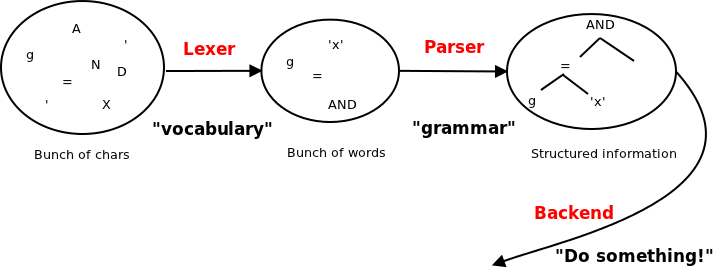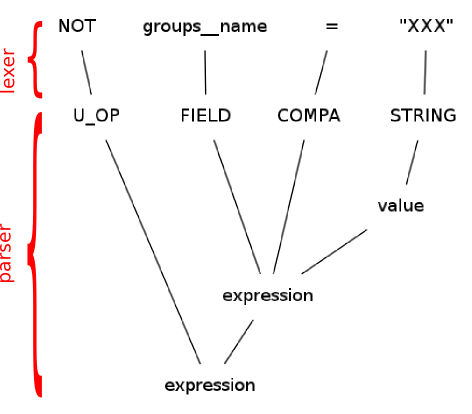Initial motivation: Searching Contacts
class Contact(models.Model):
first_name = models.CharField(max_length=50)
last_name = models.CharField(max_length=50)
#[...]
state = models.ForeignKey('State')
groups = models.ManyToManyField('Group', verbose_name=u'groupes')
- Groups have informal semantics
-
Client wants to be able to check things like
- Everybody both in group X and Y should not be in group Z
- All contacts not in group X should have state Y
-
These checks will evolve in time (no hard-coding)


Presenter Notes
Some notions are intrinsically hard to represent in GUIs
-
What's the GUI for
pictures with width > height and not marked rotate 90 if height > 600px resize to height=600px while face_detected: f blur f -
GUI multi-criteria searches are often limited to all-ANDs (sometimes all-ORs)
... but
(cond1 OR NOT cond2) AND cond3is usually unavailable -
GUIs for actions are usually limited to a linear flow of actions


Presenter Notes
Introducing PLY
- PLY is an implementation of lex and yacc for Python
- Made by David Beazley
- http://www.dabeaz.com/ply/
- Naming conventions and introspection ⇒ very "economic" code!
Let's use it to compile expressions like
groups__name="XXX" AND NOT groups__name="YYY"
(modified > 1/4/2011 OR NOT state__name="OK") AND groups__name=="XXX"
into django.db.models.Q objects


Presenter Notes
Lexer
import ply.lex as lex
tokens = (
'COMPA', # comparison operator
'STRING',
'NUMBER',
#[...]
)
t_COMPA = r'=|[<>]=?|~~?'
literals = '()' # shortcut for 1-char tokens
def t_STRING(t):
r'"[^"]*"'
t.value = t.value[1:-1]
return t
def t_NUMBER(t):
r'\d+'
t.value = int(t.value)
return t
# [...]
def t_error(t):
raise CompileException(u"Cannot make sense of char: %s" % t.value[0])


Presenter Notes
Parser in PLY
- Grammar rules go into docstrings
- Special argument p corresponds to rule parts
def p_expression_u_op(p):
'''expression : U_OP expression'''
if p[1] == 'NOT':
p[0] = ~ p[2]
means
If you encounter U_OP followed by an expression, consider this as a new expression with value determined as follows:
if the value of the U_OP is 'NOT', then the value of the final expression is the negation of the value of the initial expression


Presenter Notes
Parser in PLY - 2
import ply.yacc as yacc
def p_value(p):
'''value : STRING
| NUMBER
| DATE'''
p[0] = p[1]
def p_expression_paren(p):
"expression : '(' expression ')' "
p[0] = p[2]
def p_expression_b_op(p):
'''expression : expression B_OP expression'''
if p[2] == 'AND':
p[0] = p[1] & p[3]
elif p[2] == 'OR':
p[0] = p[1] | p[3]


Presenter Notes
Parser in PLY - 3
from django.db.models import Q
compa2lookup = {
'=': 'exact',
'~': 'contains',
'~~': 'regex',
'>': 'gt',
'>=': 'gte',
'<': 'lt',
'<=': 'lte',
}
def p_expression_ID(p):
'expression : FIELD COMPA value'
# Let's map 'groups__name = "XXX"' to
# Q(groups__name__exact="XXX")
lookup = compa2lookup[p[2]]
field = '%s__%s' % (p[1], lookup)
d = {field: p[3]}
p[0] = Q(**d)


Presenter Notes
Putting it all together
def compile(expr):
# create separate lexer and parser for each compilation
# (our app is multi-threaded)
lexer = lex.lex()
parser = yacc.yacc()
# now, parse!
return parser.parse(expr,lexer=lexer)
This will return a Q object with corresponding query (or raise a CompileException). Just use it in your views or forms:
# try with things like
# expr = 'groups__name="XXX" AND NOT groups__name="YYY"'
# or expr = 'modified > 1/4/2011 OR NOT state__name="OK"'
try:
q = compile(expr)
except CompileException, e:
# error handling
qs = Contact.objects.filter(q)


Presenter Notes
The Dark Side of Q-objects
When making complex queries spanning multi-valued relationships
- If you
AND2 Q-objects, the conditions can apply to different values of the relationship
a = Q(groups__name="XXX")
b = Q(groups__name="YYY")
q1 = (~a) & (~b)
# yields same results as
list(Contact.objects.exclude(groups__name="XXX").exclude(groups__name="YYY"))
- If you
OR2 Q-objects, the conditions must apply to the same value of the relationship
q2 = ~ (a | b)
# yields same results as
result = []
for c in Contact.objects.all():
for g in c.groups.all():
if not g.name in ["XXX","YYY"]:
result.append(c)
- Not really documented in Django's doc


Presenter Notes
Functional approach
- Instead of (or in addition to) building Q-objects, you can build functions
def p_statement(p):
'statement : ACTION expression'
if p[1] == 'MARK':
p[0] = lambda: Contact.objects.filter(p[2]).update(marked=True)
elif ...
- Now
compilereturns a function
f = compile('MARK groups__name="XXX"')
# Now, execute the action
f()


Presenter Notes
Save the earth, grow a tree
If you need something substantially more complicated, you will probably need to
- compile to a tree structure
def p_expression_op(p):
'''expression : expression ADD_OP expression'''
p[0] = OpNode(op=p[2], children=[p[1], p[3]])
- write an interpreter, e.g. a recursive one:
class OpNode:
def execute(self):
args = [c.execute() for c in self.children]
if self.op == '+':
return operators.add(*args)
else:
return operators.sub(*args)


Presenter Notes
Still Want to Know More?
- Take a look at the full code
- PLY's homepage: http://www.dabeaz.com/ply/
- Detailed tutorial on building compilers with PLY [french]: http://www.matthieuamiguet.ch/pages/compilateurs
- Django doc on...
- Q-objects: https://docs.djangoproject.com/en/dev/topics/db/queries/#complex-lookups-with-q-objects
- Lookups spanning relationships: https://docs.djangoproject.com/en/dev/topics/db/queries/#lookups-that-span-relationships
Or, even better...





